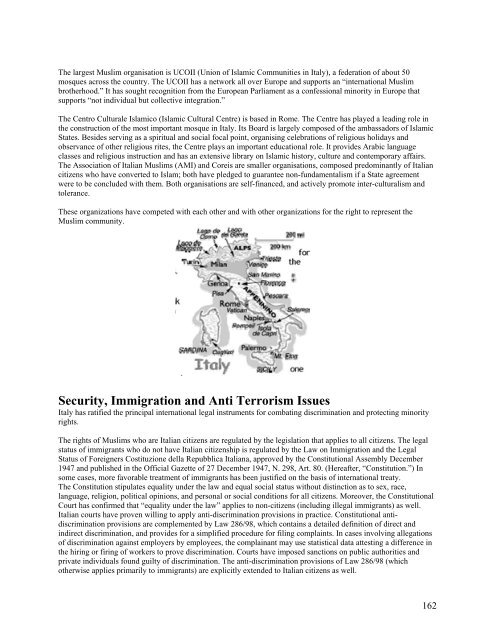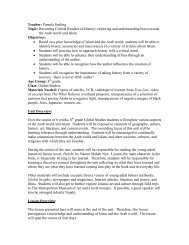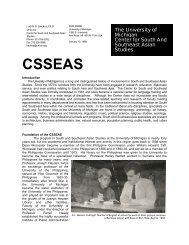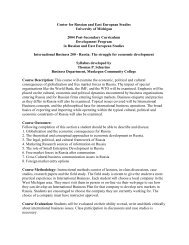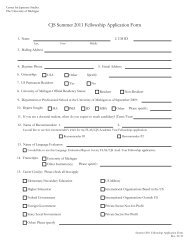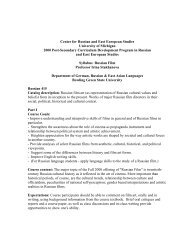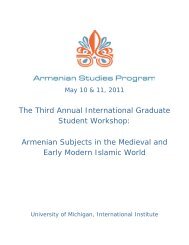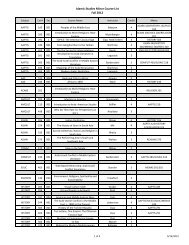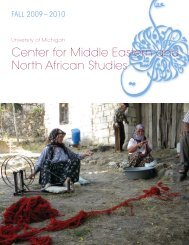Muslims in Europe: - International Institute - University of Michigan
Muslims in Europe: - International Institute - University of Michigan
Muslims in Europe: - International Institute - University of Michigan
You also want an ePaper? Increase the reach of your titles
YUMPU automatically turns print PDFs into web optimized ePapers that Google loves.
The largest Muslim organisation is UCOII (Union <strong>of</strong> Islamic Communities <strong>in</strong> Italy), a federation <strong>of</strong> about 50<br />
mosques across the country. The UCOII has a network all over <strong>Europe</strong> and supports an “<strong>in</strong>ternational Muslim<br />
brotherhood.” It has sought recognition from the <strong>Europe</strong>an Parliament as a confessional m<strong>in</strong>ority <strong>in</strong> <strong>Europe</strong> that<br />
supports “not <strong>in</strong>dividual but collective <strong>in</strong>tegration.”<br />
The Centro Culturale Islamico (Islamic Cultural Centre) is based <strong>in</strong> Rome. The Centre has played a lead<strong>in</strong>g role <strong>in</strong><br />
the construction <strong>of</strong> the most important mosque <strong>in</strong> Italy. Its Board is largely composed <strong>of</strong> the ambassadors <strong>of</strong> Islamic<br />
States. Besides serv<strong>in</strong>g as a spiritual and social focal po<strong>in</strong>t, organis<strong>in</strong>g celebrations <strong>of</strong> religious holidays and<br />
observance <strong>of</strong> other religious rites, the Centre plays an important educational role. It provides Arabic language<br />
classes and religious <strong>in</strong>struction and has an extensive library on Islamic history, culture and contemporary affairs.<br />
The Association <strong>of</strong> Italian <strong>Muslims</strong> (AMI) and Coreis are smaller organisations, composed predom<strong>in</strong>antly <strong>of</strong> Italian<br />
citizens who have converted to Islam; both have pledged to guarantee non-fundamentalism if a State agreement<br />
were to be concluded with them. Both organisations are self-f<strong>in</strong>anced, and actively promote <strong>in</strong>ter-culturalism and<br />
tolerance.<br />
These organizations have competed with each other and with other organizations for the right to represent the<br />
Muslim community.<br />
Security, Immigration and Anti Terrorism Issues<br />
Italy has ratified the pr<strong>in</strong>cipal <strong>in</strong>ternational legal <strong>in</strong>struments for combat<strong>in</strong>g discrim<strong>in</strong>ation and protect<strong>in</strong>g m<strong>in</strong>ority<br />
rights.<br />
The rights <strong>of</strong> <strong>Muslims</strong> who are Italian citizens are regulated by the legislation that applies to all citizens. The legal<br />
status <strong>of</strong> immigrants who do not have Italian citizenship is regulated by the Law on Immigration and the Legal<br />
Status <strong>of</strong> Foreigners Costituzione della Repubblica Italiana, approved by the Constitutional Assembly December<br />
1947 and published <strong>in</strong> the Official Gazette <strong>of</strong> 27 December 1947, N. 298, Art. 80. (Hereafter, “Constitution.”) In<br />
some cases, more favorable treatment <strong>of</strong> immigrants has been justified on the basis <strong>of</strong> <strong>in</strong>ternational treaty.<br />
The Constitution stipulates equality under the law and equal social status without dist<strong>in</strong>ction as to sex, race,<br />
language, religion, political op<strong>in</strong>ions, and personal or social conditions for all citizens. Moreover, the Constitutional<br />
Court has confirmed that “equality under the law” applies to non-citizens (<strong>in</strong>clud<strong>in</strong>g illegal immigrants) as well.<br />
Italian courts have proven will<strong>in</strong>g to apply anti-discrim<strong>in</strong>ation provisions <strong>in</strong> practice. Constitutional antidiscrim<strong>in</strong>ation<br />
provisions are complemented by Law 286/98, which conta<strong>in</strong>s a detailed def<strong>in</strong>ition <strong>of</strong> direct and<br />
<strong>in</strong>direct discrim<strong>in</strong>ation, and provides for a simplified procedure for fil<strong>in</strong>g compla<strong>in</strong>ts. In cases <strong>in</strong>volv<strong>in</strong>g allegations<br />
<strong>of</strong> discrim<strong>in</strong>ation aga<strong>in</strong>st employers by employees, the compla<strong>in</strong>ant may use statistical data attest<strong>in</strong>g a difference <strong>in</strong><br />
the hir<strong>in</strong>g or fir<strong>in</strong>g <strong>of</strong> workers to prove discrim<strong>in</strong>ation. Courts have imposed sanctions on public authorities and<br />
private <strong>in</strong>dividuals found guilty <strong>of</strong> discrim<strong>in</strong>ation. The anti-discrim<strong>in</strong>ation provisions <strong>of</strong> Law 286/98 (which<br />
otherwise applies primarily to immigrants) are explicitly extended to Italian citizens as well.<br />
162


